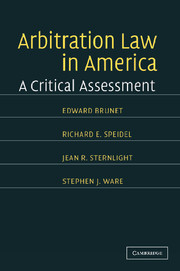Book contents
- Frontmatter
- Contents
- Acknowledgments
- Introduction
- 1 The Core Values of Arbitration
- 2 Common Legal Issues in American Arbitration Law
- 3 The Appropriate Role of State Law in the Federal Arbitration System: Choice and Preemption
- 4 Interstate Arbitration: Chapter 1 of the Federal Arbitration Act
- 5 Consumer Arbitration
- 6 International Commercial Arbitration: Implementing the New York Convention
- 7 Tension Points: Where the Authors Disagree
- Appendices
- Index
4 - Interstate Arbitration: Chapter 1 of the Federal Arbitration Act
Published online by Cambridge University Press: 16 November 2009
- Frontmatter
- Contents
- Acknowledgments
- Introduction
- 1 The Core Values of Arbitration
- 2 Common Legal Issues in American Arbitration Law
- 3 The Appropriate Role of State Law in the Federal Arbitration System: Choice and Preemption
- 4 Interstate Arbitration: Chapter 1 of the Federal Arbitration Act
- 5 Consumer Arbitration
- 6 International Commercial Arbitration: Implementing the New York Convention
- 7 Tension Points: Where the Authors Disagree
- Appendices
- Index
Summary
INTRODUCTION: THE CONTRACTUAL APPROACH TO ARBITRATION LAW
This chapter consists of proposals to reform the Federal Arbitration Act (FAA). These proposed reforms address only domestic (United States) arbitration law, which is covered by Chapter 1 of the FAA. These reforms do not address the law governing international arbitration, which is covered by Chapters 2 and 3 of the FAA, as well as by various treaties including the Convention on the Recognition and Enforcement of Foreign Arbitral Awards.
These proposed reforms rest on what I call the contractual approach to arbitration law. This approach consists of at least three principles. Stated colloquially, these principles are that: (1) you should not be sent to arbitration unless you have agreed to be there, (2) if you have agreed to arbitration then your agreement should be enforced, and (3) your arbitrator's powers are only those that you and the other party to the agreement gave the arbitrator. Stated more precisely, these three principles of the contractual approach to arbitration law are:
First Principle: a court should not send a dispute to arbitration unless the parties have formed an enforceable contract requiring arbitration of that dispute.
Second Principle: arbitration agreements should be enforced “save upon such grounds as exist at law or in equity for the revocation of any contract.”
Third Principle: because an arbitrator's power derives from the parties' contract, the arbitrator should not be permitted to reach a result that the parties could not have reached themselves by simply contracting for it.
- Type
- Chapter
- Information
- Arbitration Law in AmericaA Critical Assessment, pp. 88 - 126Publisher: Cambridge University PressPrint publication year: 2006



